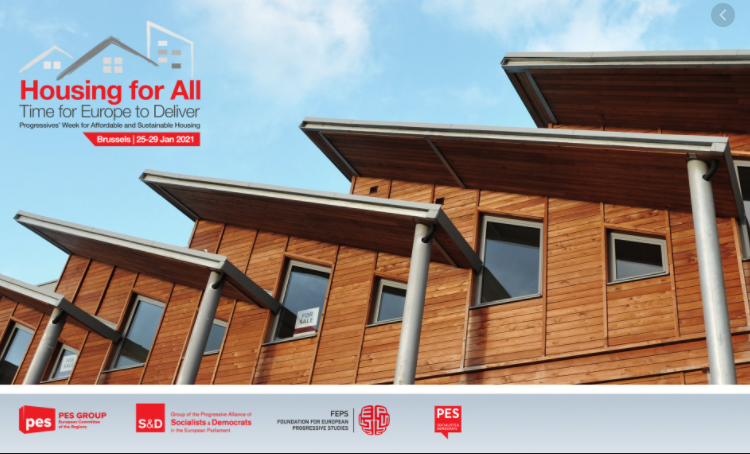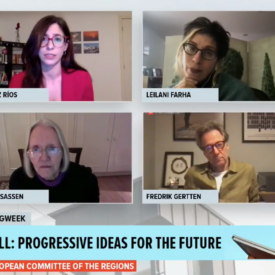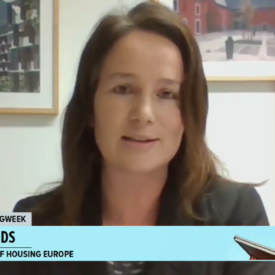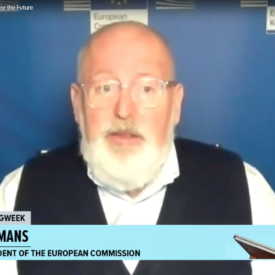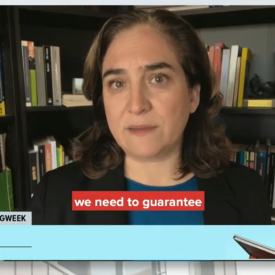The political group of PES, the Party of European Socialists, has decided to put housing at the top of the agenda for the recovery. To bring up the discussion on housing affordability, between 25th and 29th January, the political family in cooperation with the Socialist and Democrats Group in the European Parliament, the Foundation for European Progressive Studies (FEPS) and the City of Vienna organised a series of inspiring online debates framed by a Progressive Housing Week. Housing Europe has stressed the position of public, cooperative and social housing providers in Europe on several occasions. Let us walk you through.
At the very start of the Progressive Housing Week, the eye-opening documentary PUSH by the former UN Special Rapporteur on Adequate Housing, Leilani Farha and the film director Fredrik Gertten, set the scene and helped visualise the consequences of the financialisation of the sector. Housing prices have been skyrocketing in cities all around the world, while incomes have not been increasing at the same pace. The ongoing housing crisis was acknowledged by the Vice-President of the European Commission, Frans Timmermans who pointed out that deregulation has been one of its causes. “There is a mistake many of us made in the 1980s believing that leaving things to the market will benefit everyone, especially social housing. That didn’t work out well I would say and you have enough comparing material in Europe”, he said and also added what the consequences of such decisions have been, “young people can’t afford to live where jobs are, teachers can’t afford to live in the city. Housing is one of the things in your life that you need security for like health or jobs. And now we are in the perfect storm because all these three are threatened”. Adding to this, Saskia Sassen, Professor of sociology at Columbia University, stated that “we must allow people to understand that they have a voice when it comes to housing. That people who have had normal jobs retire and end up sleeping on the streets is terrifying and it’s happening everywhere. We need political action!”
The political developments in housing, however, have not been all dark and gloomy. One of the global patterns the former UN Special Rapporteur on Adequate Housing, Leilani Farha has identified is that some governments have started to respond positively to recognise that housing is a human right and not a commodity. The recently adopted own-initiative report that calls for “Access to decent and affordable housing for all’ by Dutch MEP Kim van Sparrentak from the Greens and the Next Generation EU recovery plans have been an example of that in the EU. “We need a systematic approach. We need to look at the evidence and the urgency of the situation, but also at the EUR750 billion that are on the table from the EU recovery funds and to make the argument that we build back better on what works,” Housing Europe’s Secretary-General, Sorcha Edwards underlined and added that working for the antidote has been truly motivational.
The discussion also brought together a handful of European cities whose mayors have been healing access to affordable homes locally. Increasing the supply of affordable housing and enabling different types of building has been taken into consideration by Erik Pelling, the Mayor of Uppsala in Sweden as a vital key to cope with the housing problems. Similarly, the Mayor of Lisbon, Fernando Medina, claimed: “We are building new houses. We are renewing houses. We are buying houses that we can convert into affordable housing. We launched a new programme called Safe Rent to rent Airbnbs and then sublet them to people by paying the difference.” Barcelona has also taken action. Its mayor, Ada Colau has decided to build a lot more public housing, has set up a municipal anti-eviction unit and confronted large speculative properties.
The Affordable Housing Initiative – the EU project to revitalise 100 neighbourhoods as part of the Renovation Wave and to provide inclusive, sustainable neighbourhoods – was the centre of discussion on 27th January. The session was hosted by the Brussels Office of the City of Vienna whose director, Michaela Krauer features in the second episode of Housing Europe’s series that aim at shaping the Affordable Housing Initiative together with experts from the housing world.
Slawomir Tokarski, Director, European Commission’s Directorate-General for the Internal Market, Industry, Entrepreneurship and SMEs (DG GROW), talked about the 3 main focus areas of the Renovation Wave – eradicating energy poverty and worst-performing buildings, renovation of public buildings including social housing and improving heating and cooling. By that, he explained that the Affordable Housing Initiative is supposed to combine technologies, such as digital, smart energy-efficient solutions, circular and modular renovation toolkits and eco-design, and use of renewables as energy resources. Secondly, human-centred business models, prompting social innovation and empowering citizens should be developed. Slawomir Tokarski also added that the renovated districts should be regularly monitored to ensure that they remain affordable.
Sorcha Edwards from Housing Europe underlined: “it is crucial that we get the Renovation Wave right and make sure it leaves no one behind. The Affordable Housing Initiative should be a wave to bring digital advances, affordability, social inclusion to the ground”. Aligned with that, Elena Szolgayová, Housing 2030 initiative Co-Chair & UNECE HLM Committee Chair 2013 – 2019, nicely described that “it is up to governments to create a long-term vision to support the affordability of housing. The aim of Housing 2030 is to create a symphony, with all of the instruments working together to play beautiful music”. Regarding the financial difficulties which the middle- and low-income households are experiencing and which Covid-19 has made even more obvious, she also added: “as the gap between the poor and the rich is growing and the question of housing becomes more pressing, we need to create long-term and sustainable visions to achieve the reality of affordable housing”.
During the “Concrete Actions for Social and Affordable Housing in the EU” session organised by FEPS, Tom Copley from the City of London added that the Corona crisis has been considered as an opportunity in London to transform this circumstance to tackle homelessness, more than ever. Milan Ftáčnik, Chairman of the Smart Solutions and Innovation Council, Former mayor of Bratislava, said: “housing for all means that we need to translate this into social and affordable housing for all. Not only the most vulnerable ones but also middle-income families”.
During the Progressive Housing Week, PES launched the petition “Make the right to housing a reality for all!”.
Find more about the event here. #ProgressiveHousingWeek
